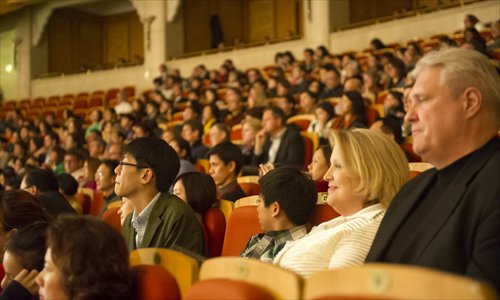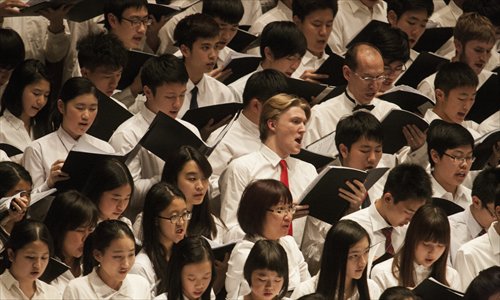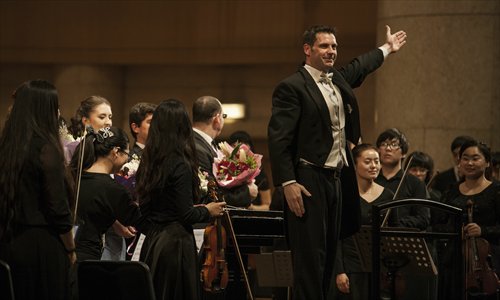Global harmony
Bathed in golden light on stage, a choir of 230 singers accompanied by a 100-strong symphony orchestra brought the Forbidden City Concert Hall to life with a live gala concert on February 18 as part of the International Schools Choral Music Society (ISCMS) Music Festival. Most choir members were students from international schools in China who shared the stage with internationally renowned soloists, conductors and composers.

Special guest Robert Hasty, a British musician conducting at the 2014 gala concert. Photo: Li Hao/GT
Humble beginnings
Hosted by Dulwich College Beijing, the ISCMS Music Festival has come a long way since it was first held in a school concert hall seven years ago. From humble origins and relative obscurity, today it has grown into the largest international music society in the Asia-Pacific region.
Such is the event's prestige that the ISCMS was able to attract many celebrities in the fields of singing, conducting and composition for this year's festival. Heading the star-studded bill on Saturday was dual Grammy Award winner Christopher Tin, whose hit composition Baba Yetu is both the theme to American computer game Civilization IV and soundtrack for the Dubai Fountain, the world's largest choreographed fountain at the base of Burj Khalifa, the world's tallest skyscraper.
Having hosted festivals at prestigious performance venues in Beijing, Shanghai, Hong Kong and Busan, South Korea, ISCMS founder and director Shane O'Shea is proud of the progress the society has made over the past seven years.

The audience enjoys the 2014 gala concert. Photo: Li Hao/GT
Inspiring students
Tin, renowned as a celebrity composer, said he was inspired by students' passion for music after rehearsing with them over three days.
"I love the students. I could chat with them all day. They are fun, full of life, and full of energy. They have very promising futures, and I hope I can inspire a few of them to stay involved in music on a professional level," Tin told Metropolitan.
"I'm honestly blown away by the passion that the students themselves have for learning. I would have loved to have done something like this when I was a student myself."
Tin's latest piece, Temen Oblak, was written in Bulgarian specially for this festival.
Literally "dark clouds" in Bulgarian, Temen Oblak is about the struggle for independence in Bulgaria. Spiritually, it's a mournful piece about death, desolation and oppression. The composition is based on a poem by Hristo Botev, a revolutionary soldier and poet who fought for Bulgarian independence from Ottoman rule.
"I wanted to expose the festival participants to a style of music that they might have never heard before, let alone sing. Bulgarian music is very unique: unorthodox rhythms, harmonies, vocal techniques and more," said Tin. "I wanted to give the students a fun challenge, and at the same time open them up to a Western form of music that's very different from classical music."

The ISCMS choir performing at the 2014 gala concert. Photo: Li Hao/GT
Star soloists
Additionally, performances by the three conductors and four soloists attracted much attention. Among the soloists were Dutch soprano Josefien Stoppelenburg, and Timothy Parker, voice and cello teacher at Dulwich College Shanghai and a former member of the world-famous choir of St John's College, Cambridge.
Works performed at the gala concert included not only masterpieces by classical composers such as Night on Bald Mountain by Petrovich Mussorgsky and Nelson Mass by Joseph Haydn, but also students' own compositions.
Each year participating ISCMS schools submit one student composer's work to Karl Jenkins, a British composer and an ISCMS patron.
Jenkins decides the winner of the annual Jenkins Award, a foundation he established to encourage young composers to pursue their musical ambitions. The winner's piece is also performed at the gala as part of the award.

ISCMS students and Shane O'Shea at the 2014 gala concert. Photo: Li Hao/GT
Composers of tomorrow
Gordan Yam of Sha Tin College, Hong Kong, was crowned this year's Jenkins Award winner for his composition Rise of the Trolls.
For student composers like Yam and John Hui, the 2013 winner of the Jenkins Award from Dulwich College Beijing, the ISCMS plays an important role in fostering their musical talent.
The piece that Hui won the Jenkins Award with is called The Hollow Men - Part I, after the T.S. Eliot poem that it takes its text from.
"The poem is really grim, but it just seemed to resonate with me when I first encountered it," said Hui.
"Amongst the gloom, I found the inspiration to add in an element of musical performance that would also express the emotional emptiness I felt from reading it."
For Hui and other students in ISCMS, this organization has done a lot to shape their identity. Hui was 11 when he attended the inaugural ISCMS Music Festival.
"So much of my personal and musical development has occurred within and alongside ISCMS," he said.
Every festival has been challenging in a different way, he recalled. For example, the first ISCMS in 2008 was his first experience with singing Latin.
He recalls that getting 500 people onstage for the fifth ISCMS in 2012 was a logistical nightmare.
And at the second ISCMS in 2009, he had to deal with his breaking voice.
"I've moved from soprano to alto, down to tenor, then stopped. Although it's a pity I'll never be able to say that I have sung in all four sections, I take great pride in my current tenor section," said Hui.
"Perhaps we get poked at every once in a while by the stereotypically manlier basses; perhaps we get gut-wrenchingly high parts all the time; perhaps we are usually the smallest section in the choir; nevertheless, I am still willing to stand up for my section, because I know that when we cleanly hit that top G or A, it's the greatest feeling in the world."
Having turned 18 on the first day of rehearsals for this year's festival, Hui was visibly shy when O'Shea told the choir and administration group it was his birthday.
He acknowledged their applause, however, waving to his peers from the back of the concert hall.
But what better way for a choir to acknowledge the birthday of one of its members than sing "Happy Birthday." As the song resonated throughout the school's concert hall, it brought smile to everyone's face and gave Hui a memorable birthday indeed.